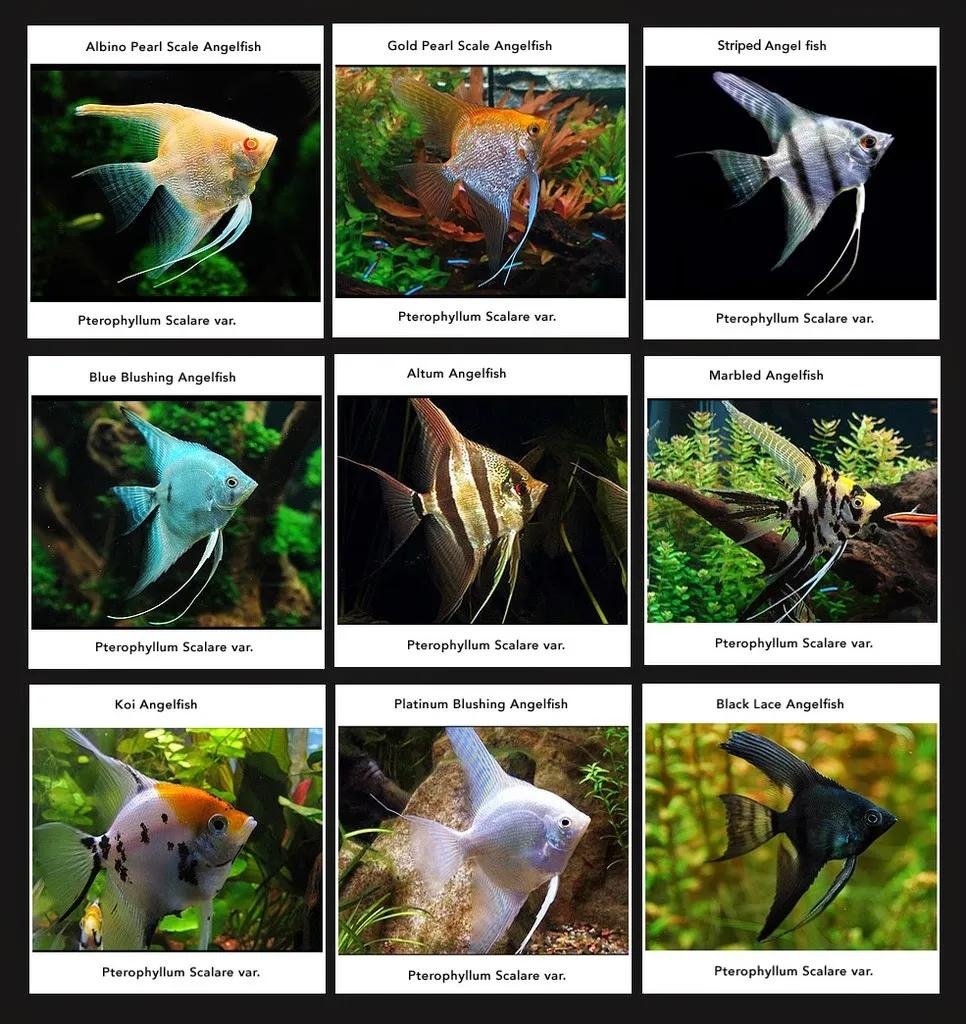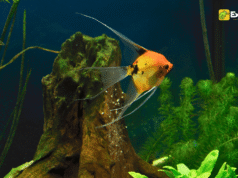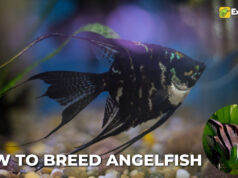
Angelfish are among the most popular freshwater fish in the aquarium hobby, known for their striking appearance and graceful swimming patterns. These iconic freshwater fish, with their distinctive triangular shape and flowing fins, add a touch of elegance to any aquarium. But how long do angelfish live? The lifespan of angelfish can vary depending on several factors, such as species, environment, and care.
In this article, we’ll explore the typical lifespan of angelfish, what influences it, and how you can ensure your angelfish live a long, healthy life. We’ll also share personal experiences and research insights to provide a comprehensive understanding of angelfish longevity.
The Angelfish Lifespan: A General Overview
On average, well-cared-for angelfish can live for 10 to 12 years in captivity.
Some individuals have even been reported to reach the ripe old age of 15! However, it’s important to understand that this is just an average. A multitude of factors, including genetics, water quality, diet, tank size, and overall care will influence the actual lifespan of your angelfish.
Factors Affecting Angelfish Longevity
Genetics: The Foundation of Lifespan
Just like humans, angelfish inherit a genetic blueprint that influences their overall health and longevity. While you can’t control their genes, you can increase the chances of getting a healthy fish by purchasing from a reputable breeder or pet store. Look for vibrant colors, active swimming, and clear eyes – all signs of a healthy angelfish with good genes.
Water Quality: The Elixir of Life
Angelfish are sensitive to water conditions, and poor water quality can significantly shorten their lifespan. Maintaining optimal water parameters is crucial for their health and well-being. This includes regular water changes, proper filtration, and monitoring of ammonia, nitrite, nitrate, pH, and temperature levels.
Diet: Fueling a Long and Healthy Life
A balanced and nutritious diet is essential for angelfish to thrive and reach their full lifespan potential. These omnivores require a variety of foods, including high-quality flakes, pellets, frozen foods like brine shrimp and bloodworms, and occasional treats of live foods or vegetables. Avoid overfeeding, as this can lead to obesity and other health problems.
Tank Size: Room to Grow and Thrive
Angelfish are relatively large fish, and they need adequate space to swim and explore. Cramped conditions can stress them out and shorten their lifespan. A minimum tank size of 20 gallons is recommended for a single angelfish, with an additional 10 gallons for each additional fish. Taller tanks are preferred, as angelfish enjoy swimming vertically.
Tankmates: The Importance of Peaceful Coexistence
While angelfish are generally peaceful, they can become territorial, especially during breeding. Choosing compatible tankmates is crucial for a harmonious community and to minimize stress. Avoid housing them with aggressive or fin-nipping species. Good tankmates for angelfish include peaceful tetras, corydoras catfish, and plecos.
Stress: The Silent Killer
Stress can have a detrimental impact on angelfish health and longevity. Overcrowding, poor water quality, aggressive tankmates, and sudden changes in the environment can all contribute to stress. Minimize stress by providing a stable and comfortable environment for your angelfish.
Disease: Prevention and Treatment
Angelfish are susceptible to various diseases, just like any other fish. Early detection and treatment are key to preventing serious health problems and ensuring a long lifespan. Keep a close eye on your fish for any signs of illness, such as lethargy, loss of appetite, white spots, or fin rot. Consult a veterinarian or experienced aquarist if you notice any concerning symptoms.
Read: 13 Common Angelfish Diseases and Illnesses With Treatment
How Long Do Angelfish Live in the Wild?
Angelfish in the wild typically have a lifespan of 5 to 10 years. While they can live up to 12 years under ideal conditions, this is often not the case due to the numerous challenges they encounter in their natural environment. The harsh realities of their natural environment make it difficult for them to reach their maximum lifespan potential. In contrast, angelfish in captivity, with proper care, can live much longer.
Factors Affecting Angelfish Lifespan in the Wild
1. Predators: In the wild, angelfish are vulnerable to a variety of natural predators, including larger fish, birds, and aquatic reptiles. These predators pose a constant threat, which significantly reduces the average lifespan of angelfish in their natural habitat.
2. Food Scarcity: Wild angelfish must compete for food, which is not always readily available. The scarcity of nutrient-rich food sources can lead to malnutrition, affecting their growth and overall lifespan.
3. Environmental Factors: Angelfish are sensitive to environmental changes, such as fluctuations in water temperature, pH levels, and seasonal variations. These factors are unpredictable in the wild and can have a major impact on their survival.
4. Disease and Parasites: In their natural habitat, angelfish are exposed to various diseases and parasites. Without the controlled environment of an aquarium, these health threats are more difficult to manage, often leading to a shorter lifespan.
How Long Do Angelfish Live in Captivity?
Angelfish tend to live longer in captivity, where they can reach their full lifespan potential. In a well-maintained aquarium, angelfish can live 10 to 15 years, with some individuals even reaching up to 20 years under exceptional care.
Factors Influencing Angelfish Lifespan in Captivity
1. Controlled Environment: The primary reason angelfish live longer in captivity is the controlled environment of an aquarium. Without the constant threat of predators, they can thrive and live longer lives.
2. Water Quality: In captivity, water quality can be consistently maintained, ensuring that parameters such as temperature, pH, and hardness are within optimal ranges. Proper filtration and regular water changes are essential for keeping the water clean and free from toxins.
3. Balanced Diet: Angelfish in captivity benefit from a balanced diet that includes high-quality flakes, pellets, and live or frozen foods. Regular feeding and proper nutrition contribute to their overall health and longevity.
4. Tank Size and Setup: Providing a spacious tank with plenty of swimming space and hiding spots is crucial for the well-being of angelfish. A larger tank reduces stress and promotes a longer lifespan.
5. Tank Mates: Choosing compatible tank mates is important for maintaining a peaceful environment. Angelfish are generally peaceful but can become territorial, so avoiding overly aggressive or territorial species helps reduce stress.
6. Regular Maintenance: Routine tank maintenance, including regular water changes, cleaning, and monitoring of water parameters, is key to keeping angelfish healthy and extending their lifespan.
How to Choose Angelfish with a Good Lifespan

Selecting angelfish with a good lifespan begins with choosing healthy, high-quality individuals. Here are some tips:
- Fin Profile: A good angelfish will have straight, untwisted dorsal and caudal fins. This is a sign of a healthy fish with good genetics.
- Color Profile: Look for angelfish with vibrant, natural colors. Avoid fish with unusual or dull coloration, as this could indicate poor health or improper breeding practices.
Maximizing Angelfish Lifespan: Tips from Experienced Aquarists
If you want to maximize the lifespan of your angelfish, consider the following tips:
1. Tank Size: House a single angelfish in at least a 25-gallon tank. Larger tanks provide more space for swimming and reduce stress, which can improve lifespan.
2. Stable Water Parameters: Consistently maintain water parameters within the ideal range: 77-84°F (25-29°C) for temperature, pH 6.5 to 7.0, and water hardness 5° to 13° dGH. Regularly test and adjust the water to ensure a stable environment.
3. High-Quality Filtration: Use a high-quality filter to keep the water clean and free from toxins. Ensure the filter is appropriately sized for your tank and perform routine maintenance to prevent clogs and blockages. A canister filter is often recommended for larger tanks.
4. Weekly Water Changes: Perform 20% water changes every 1-2 weeks to remove accumulated waste and maintain water quality. This practice is crucial for keeping your angelfish healthy.
5. Balanced Diet: Offer a balanced diet that includes high-quality pellets and a variety of live or frozen foods. Feed your angelfish 2-3 times a day in small portions to prevent overfeeding and maintain water quality.
6. Aquatic Plants: Adding aquatic plants to your tank provides enrichment for your angelfish and helps improve water quality by absorbing excess nutrients.
7. Choose Compatible Tank Mates: Select tank mates that are compatible with angelfish to avoid stress and aggression. Quarantine new fish for at least two weeks before introducing them to your tank to prevent the spread of diseases.
Interesting Facts About Angelfish Lifespans
- The oldest known angelfish lived nearly 20 years in an aquarium, far exceeding the typical lifespan of 10-15 years.
- Angelfish grow slowly, reaching full size between 12-24 months old. Their growth rate can impact their total lifespan.
- Angelfish typically reach sexual maturity for breeding around 6-12 months old when properly fed.
- During their lifespan, angelfish progress through three key life stages: larval, juvenile, and adult. Each stage requires particular care.
- Selective breeding has produced angelfish with different fin shapes, patterns, and colors. Genetics play a significant role in determining their lifespan.
My Personal Experiences with Angelfish Longevity
I’ve been keeping angelfish for over a decade, and I’ve had the pleasure of watching many of them thrive and reach their full lifespan potential. One of my angelfish, a beautiful marble angel named Luna, lived for an impressive 14 years! I attribute her longevity to a combination of factors, including good genetics, meticulous water care, a varied diet, and a stress-free environment.
On the other hand, I’ve also experienced the heartbreak of losing angelfish prematurely due to various reasons, such as disease or incompatible tankmates. These experiences have taught me valuable lessons about the importance of proper care and attention to detail.
FAQs – Frequently Asked Questions
What should I do if my angelfish shows signs of illness?
Isolate the affected fish in a quarantine tank and seek appropriate treatment. Prompt action can prevent the spread of disease to other tank mates.
Can angelfish be bred in captivity, and does it affect their lifespan?
Yes, angelfish can be bred in captivity. Proper breeding practices can lead to healthy offspring. While breeding doesn’t necessarily affect the lifespan of the parents, it’s essential to provide them with optimal conditions during the breeding process to reduce stress.
Can angelfish be kept with other fish species in a community tank?
Angelfish are generally peaceful but can be territorial. Choose tank mates that are compatible and avoid overly aggressive or territorial fish to minimize stress and maintain harmony in the tank.
How long can angelfish live without food?
Healthy angelfish can survive up to 3 days without food, though it depends on their age and size.
Conclusion
While the average lifespan of angelfish is around 10 to 12 years, with proper tank setup, care and attention, angelfish can live 10-15 years or longer. By providing optimal water quality, a nutritious diet, ample space, compatible tankmates, and a stress-free environment, you can significantly increase the chances of your angelfish reaching their full lifespan potential.
Remember, angelfish are not just beautiful ornaments for your aquarium; they are living creatures that deserve our love and respect. By committing to their well-being, you’ll be rewarded with years of companionship and the joy of witnessing their graceful movements and vibrant colors.










